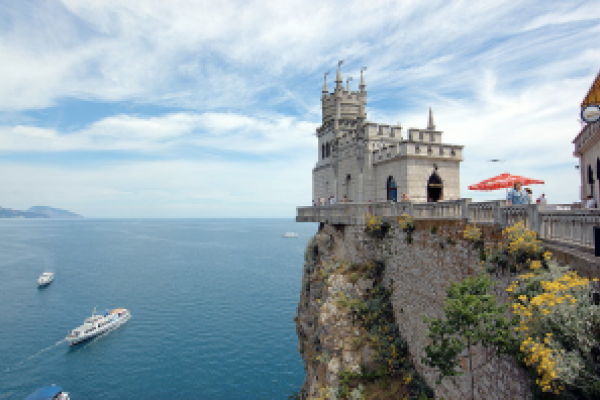
Learn Survival Ukrainian
Wikitravel users have collectively created a free Ukrainian phrasebook with the goal of making it possible for travelers to "get by" while traveling in areas where Ukrainian is spoken.
Wikitravel phrasebooks are available in many languages and each one varies in depth and detail. Most of the phrasebooks include a pronunciation guide, a general phrase list, information about dates and numbers, a color list, transportation-related phrases, vocabulary for shopping and phrases for eating and drinking. Some are even more in depth, and all are free!
About Ukrainian Language
From Wikitravel: Ukrainian is spoken by over 40 million people in Ukraine and other countries. Among Ukrainian citizens there are few very few who speak only Ukrainian, very few who speak only Russian, and virtually everyone speaks both.
In general the Western part of Ukraine speaks mostly Ukrainian (usually around Lviv (Lvov is a Russian version, and Lwow [lvoov] is a Polish one), while Russian is more commonly used else where, including Kiev, but it has always been bilingual throughout its history as Russian and Ukrainian speakers understand each other without the need of a translator. One common trait of Ukrainian is that it often replaces Russian e/ye and o/yo with i/yi. For instance, the patronymic suffixes -ov or -yov in Russian are -iv/-yiv in Ukrainian.
Ukrainian is an East Slavic language most similar to Russian and Belorussian, with strong similarities with Polish. It uses a variation of Cyrillic alphabet (some cosmetic [there are some false friends and letters that are used in only one of the languages] differences from Russian), but there are many words that are more similar to Polish than to Russian. The Russian hard sign is not used but rather an apostrophe is put in its place. Either way, the apostrophe and the hard sign it represents are very rarely used in Ukrainian since the 1918 spelling reform.
Ukrainian is comparatively very similar towards Russian: much of the vocabulary is similar to Russian, the grammar is very similar, but the differences include easier pronunciation and the addition of one other case: The Vocative.
From Wikipedia: Ukrainian (Ukrainian: украї́нська мо́ва ukrayins'ka mova, [ukrɑˈjɪnʲsʲkɑ ˈmɔwɑ]) is a language of the East Slavic subgroup of the Slavic languages. It is the official state language of Ukraine. Written Ukrainian uses a variant of the Cyrillic alphabet.
The Ukrainian language traces its origins to the Old East Slavic of the early medieval state of Kievan Rus'. Ukrainian is a lineal descendant of the colloquial language used in Kievan Rus' (10th–13th century). From 1804 until the Russian Revolution Ukrainian was banned from schools in the Russian Empire of which Ukraine was a part at the time. It has always maintained a sufficient base among the Ukrainian people (especially in Western Ukraine where the language was never banned) in its folklore songs, itinerant musicians, and prominent authors.
The standard Ukrainian language is regulated by the National Academy of Sciences of Ukraine (NANU), particularly by its Institute of Ukrainian Language, Ukrainian language-informatical fund, and Potebnya Institute of Language Studies.
The Ukrainian language has the following linguistic heritage: Indo-European > Balto-Slavic > Slavic > East Slavic > Ukrainian
View the Ukrainian Phrasebook.